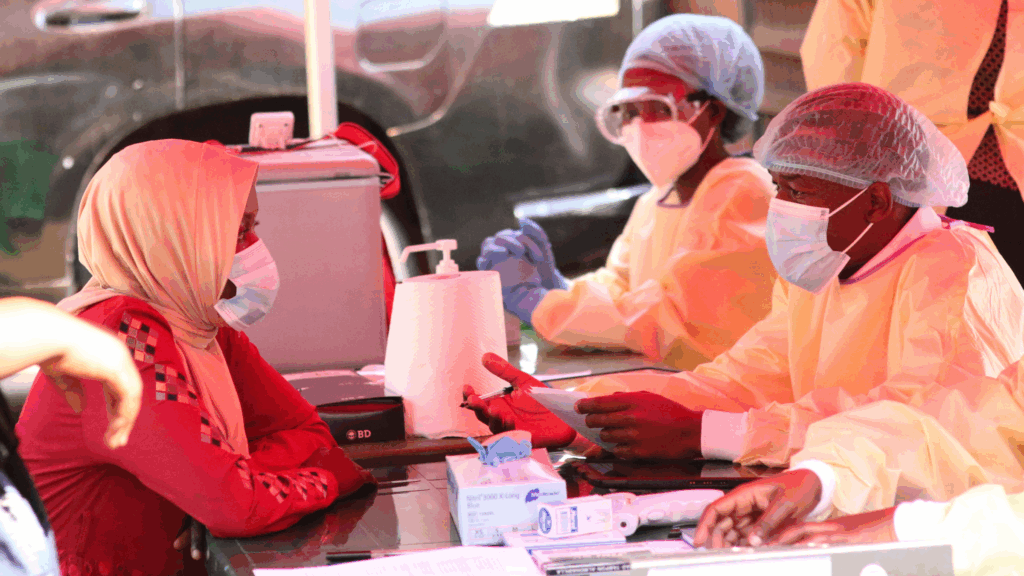July 10, 2025
IAVI receives €1 million from Dutch government for Sudan virus vaccine development
Grant supports ongoing clinical efficacy trial in Uganda in response to Sudan virus disease outbreak.

IAVI is pleased to announce an emergency award of €1 million from the Dutch government to support clinical evaluation of IAVI’s investigational Sudan virus (SUDV) vaccine candidate* in Uganda. The World Health Organization (WHO) prioritized evaluation of IAVI’s single-dose candidate vaccine, which was already prepositioned in Uganda, as part of a global collaborative effort supporting the country’s response to its sixth outbreak of Sudan virus disease (SVD). The outbreak was announced on Jan. 30, 2025, the trial began only four days later on Feb. 3, and the outbreak was declared over on Apr. 26.
IAVI provided more than 2,000 doses for use in the efficacy ring vaccination trial dubbed “Tokemeza,” at the Makerere University Lung Institute in Kampala, Uganda, led by the WHO. Tokemeza is Swahili for “to eradicate” or “to eliminate.” Ring vaccination is a targeted vaccination strategy designed to identify and vaccinate groups, or rings, of individuals in the index case’s contact network. As part of the Tokemeza trial, more than 130 volunteers in 17 rings were randomized for vaccination with one dose of the investigational product. The study’s primary objective is to evaluate the vaccine candidate’s efficacy in protecting people against lab-confirmed SVD. Volunteers are currently being monitored.
“IAVI is grateful to the Dutch government for this critical support to continue advancing Sudan virus vaccine development during ‘peacetime,’ which is when outbreak vaccine development efforts are most likely to lapse,” said Swati Gupta, DrPH, MPH, vice president and head of emerging infectious diseases and epidemiology, IAVI. “The urgency shouldn’t end when the outbreak ends. With this support, we can continue to work with partners in country to generate critically important safety and immunogenicity data needed to advance development of this vaccine candidate against this unmet clinical need.”
A total of 12 confirmed and two probable cases were reported during the Uganda SVD outbreak, including four deaths (two confirmed, two probable), with a case fatality ratio (CFR) of 29%.[1] A CFR of 41-100% has been recorded across the nine reported SVD outbreaks in sub-Saharan Africa.[2] No vaccines or specific treatments are available for SVD, a severe disease with potentially long-term health consequences including fetal loss, hearing loss, widespread bleeding, and organ failure, among others.
With this funding, IAVI and our partners are carrying out critical activities over the next 12 months in support of the Tokemeza trial, including dissemination activities such as publication and presentation of results in scientific journals and at scientific meetings and conferences.
The award also covers lab-based activities at the IAVI Design and Development Laboratory (DDL) in Jersey City, New Jersey, that will accelerate and improve SUDV vaccine manufacturing for late-stage product development and production. Founded in 2008 with a focus on HIV vaccines, the DDL today is IAVI’s vaccine development hub for emerging infectious diseases (EIDs). DDL scientists and researchers specialize in the development of the recombinant vesicular stomatitis virus (rVSV) vector platform – the same technology used to produce ERVEBO®, Merck’s single-dose Zaire ebolavirus (ZEBOV) vaccine, which is licensed in more than a dozen countries.
rVSV is a well-studied technology with demonstrated safety and efficacy across diverse populations, including pregnant women and children. The rVSV platform elicits rapid immune responses and enables streamlined, cost-effective vaccine production, which is crucial for addressing unpredictable disease outbreaks. IAVI’s rVSV-based SUDV vaccine candidate* has previously been shown to be safe, well-tolerated, and immunogenic in an IAVI-sponsored Phase 1 clinical trial in the U.S. The vaccine candidate has also been shown to be safe, immunogenic, and efficacious in animal models in multiple preclinical studies. These data generated so far and from the Tokomeza trial are necessary to advance the vaccine’s clinical development and accelerate its licensure in accordance with the principles of equitable access and affordability to ensure global access, especially in the most affected communities in Uganda and elsewhere.
IAVI’s EID vaccine manufacturing partner is Batavia Biosciences in Leiden, The Netherlands. Batavia is a contract-development and manufacturing organization focused on delivering sustainable, low-cost manufacturing solutions in the fields of infectious diseases and cancer.
Funding support for IAVI’s contributions to Tokemeza was provided by other funders as well, including the Coalition for Epidemic Preparedness Innovations, European Union Health Emergency Preparedness and Response, Canada’s International Development Research Centre, and the Japanese Ministry of Finance, with further support from the Africa Centres for Disease Control and Prevention. IAVI receives support from the Biomedical Advanced Research and Development Authority (BARDA), part of the Administration for Strategic Preparedness and Response within the U.S. Department of Health and Human Services, for the SUDV vaccine development program.
Read our fast facts about the outbreak and WHO’s statement for more information.
*In 2022, Merck, known as MSD outside the United States and Canada, produced and donated to IAVI vials of rVSV∆G-SEBOV-GP candidate vaccine from existing investigational drug substance to supplement IAVI’s ongoing SUDV vaccine development program. IAVI now acts as developer and regulatory sponsor and is responsible for all aspects of future development of rVSV∆G-SEBOV-GP.
[1] https://www.who.int/emergencies/disease-outbreak-news/item/2025-DON566
[2] https://www.afro.who.int/health-topics/ebola-disease/sudan-virus-disease#:~:text=Case%20fatality%20rates%20of%20the,with%20the%20national%20response%20teams